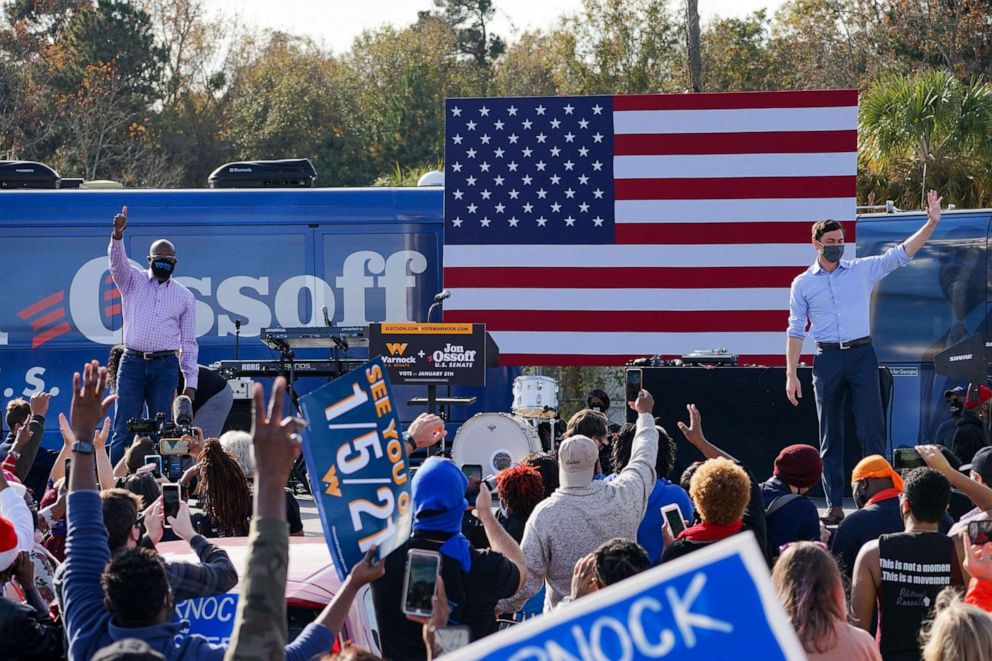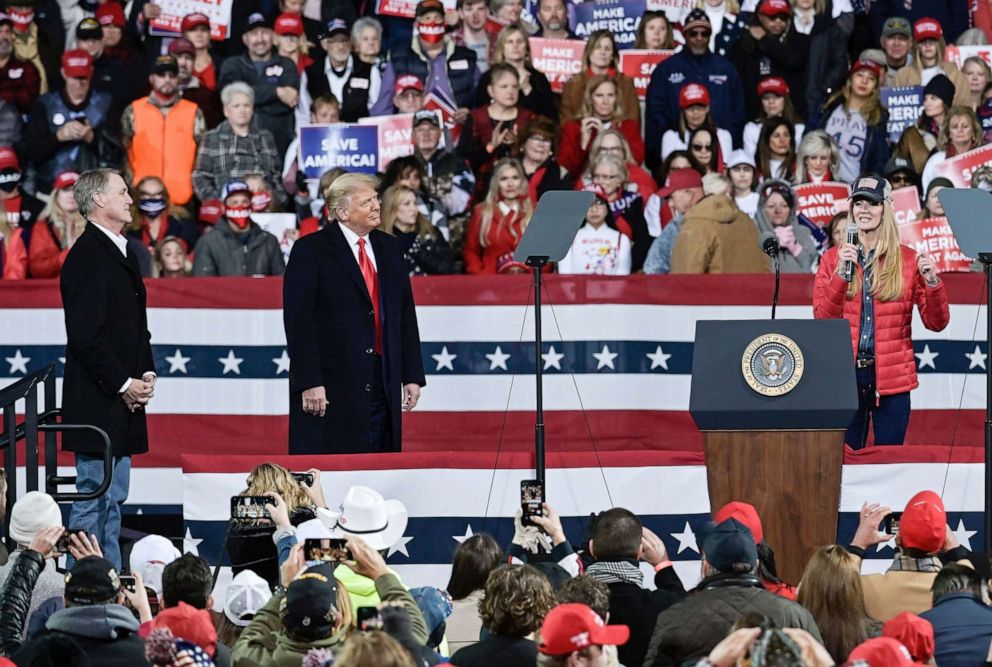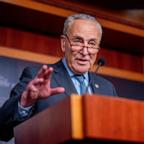Control of the Senate puts Georgia runoffs in national spotlight
The races are bringing Republican and Democratic firepower to the Peach State.
With control of the Senate hanging in the balance, Georgia’s dual runoffs elections in January are taking on outsize influence over the next four years of governing under a newly-elected president.
More than six weeks into the pair of races, which have captured the nation's attention, each party’s heavyweights have hit the stump to gin up their bases, campaign cash continues to flood the state and national forces are shaping the contours of the two contests in the new battleground.
The Democrats -- Jon Ossoff, a once-unsuccessful congressional candidate and investigative journalist, and Rev. Raphael G. Warnock, a prominent Black preacher in the South as the senior pastor of the storied Ebenezer Baptist Church -- are attempting to cement Georgia's status as a swing state by securing the narrowest of majorities in the Senate if they can defeat the two GOP incumbents.

But getting there, much like any other runoff election, will come down to turnout.
"You all did something extraordinary in November," President-elect Joe Biden, the first Democrat to win the state in a presidential election since 1992, said last week while campaigning for Ossoff and Warnock in Atlanta. "You voted in record numbers. You voted to improve the lives of every Georgian. And you voted as if your life depended on it. Well, guess what? Now you're going to have to do it again come Jan. 5."
Vice President-Elect Kamala Harris echoed Biden's sentiments on Monday as she hit the campaign trail for Ossoff and Warnock, urging Georgians to think about their votes on a national level.
"I'm not here to tell you what's in your best interest. But I am here to say that the decision you make, the work you put into this, it will impact people who you may never meet, people who may never know your names," Harris said.
For Republican Sens. David Perdue and Kelly Loeffler, who are campaigning in lockstep, their hopes of retaining their seats rely on an odd quandary: staunchly backing an outgoing president, who refuses to concede his loss, and his false assertions about a stolen election that could hurt their chances next month.
Still, it is Democrats who face a tall order: runoff elections historically favor Republicans, political and election experts told ABC News. But with a wildcard in President Donald Trump, and his assailing of the integrity of the electoral system looming over the race, most aren’t ready to count the Democrats out -- particularly in such close contests.
Politics and religion overlap on the trail
Like many other southern states, Georgia's modern political history developed alongside the Civil Rights movement of the 1960s and was harbored in the leadership of Dr. Martin Luther King, Jr. The link between the past and the present has since been amplified under the national spotlight, particularly in the race between Warnock and Loeffler, despite the four candidates making the strategic decision to run in pairs.
The overlap between political activism and faith-based organizations in Georgia is multifaceted, according to political experts, with each party's base in the Peach State consisting of faith-conscious supporters. In the aftermath of a general election year that saw heightened mobilization from Black voters, community-based organization efforts are likely to play a key role in getting voters to turn out for a second time.
"For any Republican here in Georgia, getting the white, Evangelical vote [is critical to] getting a big turnout for that group, and for Democrats, it's the African American vote," said Dr. Alan Abramowitz, a political scientist and professor at Emory University in Atlanta.
"The problem Democrats have had is getting African American voters to turn out in runoff elections, but with the national importance of the race, and with Warnock there, I think that that may help them," he said.
When polls opened for the first day of early voting for the runoff elections on Dec. 14, turnout for in-person voting eclipsed the total for the first day of early voting in the Nov. 3 election (which landed on Columbus Day, a holiday, leaving some polling locations across the state closed). More than 168,000 voters showed up at the polls, compared to some 128,000 votes for the general election when that total surpassed the previous record set four years earlier by a stunning 42%.
In total, more than 1.4 million votes have already been cast in the runoff elections, according to data compiled by Georgia Votes, including over 41,000 voters who did not participate in the presidential election -- an encouraging sign for Democrats and one that defies the typical trend for runoffs, which often see lower turnout.
In this cycle’s outstanding contests, more than half a century since Dr. King delivered a sermon at Ebenezer Baptist Church, Warnock’s association with the church has served up both confidence and tension when it came to establishing his own political brand, while fending off attacks from Loeffler and other high-profile Republicans.
The GOP candidates have sought to cast both Democrats as "radical" and tether them to liberal tenets of the Democratic Party, even if both Ossoff and Warnock are running to the middle in a similar fashion as Biden and neither actually supports those policies, such as defunding the police and Medicare-for-All. But the tag team approach between the candidates has allowed the Republican contenders to focus their attacks on Warnock, who was the top vote-getter in his race with Loeffler last month amid a divided Republican field, and his position at the pulpit.
Republicans have frequently invoked Warnock’s record and sermons in an attempt to question the motives behind his policy proposals, repeatedly labeling him a "radical."
"Kelly's opponent is a dangerous extremist who is radically opposed to your values," Trump said at a rally in early December, specifically highlighting Warnock in between his efforts to push baseless claims of a "rigged" presidential election.
"He’s used the Bible to justify these types of attacks and make other divisive statements," Loeffler said during the sole debate between the two candidates in December.
During the debate, Warnock called Loeffler’s attacks a distraction from giving voters a reason to vote for her. Over the weekend, a coalition of Georgia’s Black pastors criticized Loeffler for her portrait of her rival in an open letter, arguing that it amounts to "a broader attack against the Black Church and faith traditions for which we stand," according to the New York Times.
“My faith is the foundation upon which I have built my life. It guides my service to my community and my country. [Sen. Loeffler’s] attacks on our faith are not just disappointing -- they are hurtful to Black churches across Georgia,” Warnock said in a recent tweet.
The Loeffler campaign did not respond to an ABC News request for comment.
The assault on Warnock — and by association, Ossoff — is a similar playbook Republicans embraced for November that helped them outperform expectations down-ballot. In the weeks since the election, not much has changed for the GOP, with both Perdue and Loeffler using the same tactics to rile up their conservative base.
The strategy on both sides to campaign as virtual running mates is also expected to lead to a singular outcome for the races, experts say, instead of a possible split judgment across the two elections.
"The vast majority of voters are going to vote straight ticket to vote for both Democrats or for both Republicans, but in a very close race there couldn't be enough [voters] who for some reason split their ticket between the two that you could get a split outcome," said Abramowitz.
The Trump factor
But further muddling expectations for the race is the president, who could potentially hamstring his party’s candidates by continuing to make unsubstantiated claims of widespread fraud in the election and sowing doubt about the process.
As Loeffler and Perdue seek to maintain much-needed support from Trump’s loyal base, the two are attempting to convince those voters that while the November election was "stolen" from the president, the election will be fair when they vote again in early January. That balancing act could cut against their core ability to motivate the base, if Trump’s supporters don’t trust the system.

"So many Republicans live and die by what Trump says, and so if he says that the system's not to be trusted, the machines aren't registering the votes properly, then that'll increase the number of people who will believe it. And the logical next step is, OK, so why bother to go vote," Charles Bullock, a political science professor at the University of Georgia, previously told ABC News.
Late last week, Loeffler showed no signs of wavering from Trump’s futile crusade to try to hold onto his presidency, still refusing to acknowledge Biden as the incoming president.
"The President has a right to every legal recourse. That's what's playing out right now. I'm focused on winning this race on Jan. 5," she told reporters ahead of the president’s second expected visit to the state on the eve of the runoffs.
The next day, Warnock pounced on his opponent’s unwillingness to both acknowledge the election’s outcome and rule out the possibility of joining a Republican long-shot effort to overturn Biden’s victory when Congress convenes to count the electoral votes on Jan. 6, the day after the runoffs.
"She's willing to wage war against the voices of the very people she's supposed to be representing," Warnock told ABC’s "The View" last Thursday. "Now she's leaving open the option that she would perhaps challenge it in Congress. I think it's undemocratic. It's un-American, and it's unfortunate."
Still, Republicans are advantaged in the race by history and the anticipated drop-off among Democratic voters that has previously plagued the party’s candidates in the state. Some strategists believe that Republican voters, fully aware of the stakes, won’t "cut off their noses to spite their faces" in the overtime elections.
"It's much more of a pragmatic kind of conservative state. And I think that you're gonna find that a lot of people are not as motivated on the Democrat side as on the Republican side," Jay Williams, a Republican consultant in Georgia, said. "Republicans are going to make sure that they show up."
ABC News' Meg Cunningham contributed to this report.




